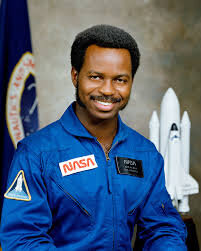About the McNair Scholars Program
Ronald E. McNair Postbaccalaureate Achievement Program
The Ronald E. McNair Postbaccalaureate Achievement Program, one of eight esteemed federal TRIO programs, is specifically designed to eliminate social, academic, and cultural obstacles that hinder students from attaining undergraduate and graduate degrees. This program bears the name of Dr. Ronald E. McNair, a pioneering laser physicist who grew up in segregated public schools and attained a PhD at Massachusetts Institute of Technology (MIT) before becoming the second African American to travel in space. After his death in the 1996 NASA Space Shuttle Challenger accident, Congress allocated funding for a new TRIO Program that would honor his remarkable legacy.
Since 1992, Truman has been consistently awarded competitive McNair grants, ensuring continuous support for a minimum of 31 Scholars each year.
 Who is Dr. Ronald E. McNair?
Who is Dr. Ronald E. McNair?
Born on October 21, 1950, in Lake City, South Carolina, Ronald Erwin McNair found early inspiration in his family and from a teacher who recognized his scientific potential and fostered his ambition to excel academically.
As valedictorian of Carver High School in 1967, Dr. McNair set for himself the goal of attaining a PhD within a decade of getting his high school diploma. He graduated magna cum laude with a Bachelor of Science degree in physics (1971) from North Carolina A&T State University (Greensboro) before enrolling in the prestigious Massachusetts Institute of Technology. Remarkably, at the age of 26, just a few months shy of his self-imposed ten-year deadline, Dr. McNair earned his PhD in laser physics (1976).
While working as a staff physicist with Hughes Research Laboratory, Dr. McNair quickly established himself as an esteemed expert in laser physics. He received numerous accolades, including being a Presidential Scholar (1971-74), a Ford Foundation Fellow (1971-74), a National Fellowship Fund Fellow (1974-75), and a NATO Fellow (1975). In addition to his academic pursuits, he excelled as a 5th degree black belt Karate instructor and displayed his musical talent as an accomplished saxophonist. He also enjoyed running, boxing, football, playing cards, and cooking.
Recognizing his remarkable achievements, NASA selected Dr. McNair for the space shuttle program in 1978. His first space shuttle mission launched successfully from Kennedy Space Center on February 3, 1984. Tragically, two years later, he was chosen as a mission specialist aboard the ill-fated U.S. Challenger space shuttle. He was killed when the Challenger exploded one minute and thirteen seconds after liftoff. Dr. McNair was posthumously awarded the Congressional Space Medal of Honor.
Following his untimely passing, members of Congress dedicated funding to establish the Ronald E. McNair Post-Baccalaureate Achievement Program. The program’s aim was to empower low-income, first-generation college students, as well as individuals from historically underrepresented racial and ethnic backgrounds, to broaden their educational and professional horizons by pursuing doctoral degrees. For over 30 years and now spanning across 151 McNair projects nationally, Dr. McNair’s legacy endures through the program’s commitment to fostering intellectual curiosity, building academic communities, nurturing dedication and resilience, and fostering remarkable achievements among its scholars.
What is TRIO?
The Federal TRIO Programs are a collection of educational opportunity outreach programs designed to inspire and support students from historically underrepresented backgrounds in education. Consisting of six outreach and support programs, TRIO aims to empower students to successfully navigate the academic pipeline, from middle school to post-baccalaureate programs. TRIO also includes a training program for directors and staff of TRIO projects, as well as a dissemination partnership program that encourages the adoption and replication of successful TRIO projects at institutions and agencies that do not currently possess TRIO grants.